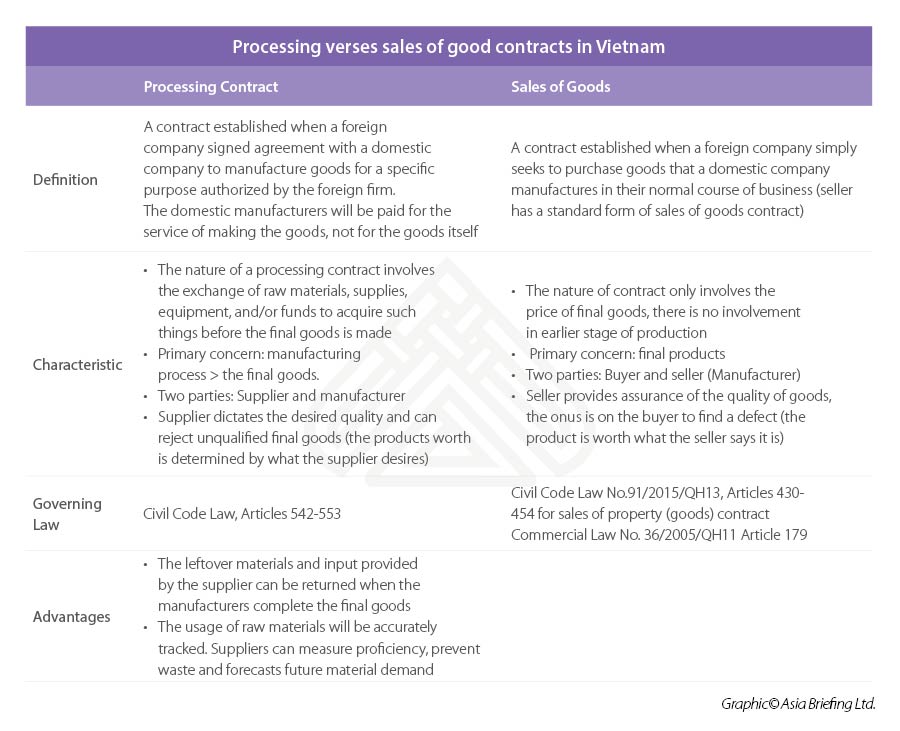Processing Contracts in Vietnam: What Are They and How to Use Them

While Vietnam has several legal structures that can be used as a necessary building block to a successful Vietnam sourcing strategy, it can often be difficult for companies (particularly those new to Vietnam) to decide on the optimal solutions needed to support their mainland sourcing activities.
With so many quality control and trading agents available offering one-stop sourcing services and business-to-business (B2B) online platforms that allow direct contact with suppliers, many will argue that it could be just as effective to utilize a subcontracting agreement and intermediate parties to get the job done.
Many foreign investors diversifying their supply chains are choosing Vietnam to manufacture and export their products. However, these supply chain shifts can bring new challenges to a business, including labor problems, poor factory conditions, or product quality issues.
This is especially true for brands that manufacture in Vietnam and export their products using unreliable suppliers or factories. It is imperative for businesses to evaluate suppliers to prevent any supply chain issues that may affect business as normal.
Why having the right contract matters
Foreign investors looking to manufacture in Vietnam should also ensure they have proper contracts in place to avoid business disruptions down the line. There are various types of contracts depending on the business purpose of the foreign company.
For example, a sales of property (goods) contract may be appropriate for an investor buying goods from a domestic company during normal business operations. However, a processing contract may be more appropriate for a foreign company that wants to import raw materials to Vietnam for processing and manufacturing and re-exporting to another market. The foreign company or supplier pays the local manufacturer for services of manufacturing or processing the product.
A processing contract is ideal for investors looking to use a domestic entity (rather than setting up their own facility) to manufacture or process goods to export to another country, their home country or sell to another entity.
What is a processing contract?
As per Vietnamese law, a processing contract is an agreement between parties whereby a processor carries out work to create products at the request of a supplier and the supplier receives the products and pays the relevant fees.
Suppliers or the foreign investor would supply the raw material including the agreed quantity, equipment, including documents, and instructions on how to manufacture the product.
Processing contracts involve the exchange of raw materials, supplies, equipment, and/or funds to be acquired before the final product is made.
A processing contract also has provisions for the return of excess raw materials and therefore the raw materials can be tracked accurately allowing the supplier or investor to ensure a return on their investment.
In addition, the manufacturing party is not allowed to hold materials, supplies or equipment as ransom in exchange for payment if they do not fulfill the service as per the processing contract. This removes a lot of ambiguity that is found in a general supply contract making it easier for the foreign investor to be assured of their investment.
The supplier thus gains more control over what the finished products are as they can reject the goods if they are not made as per the quality desired. In this case, the supplier owns the goods, raw materials, materials and pays the local manufacturer for the service which is either processing or manufacturing the product.
Processing contract requirements
A processing contract must be made in writing and at a minimum must include:
- Name and address of contracting parties and the direct processor;
- Names and quantities of products to be processed;
- Processing price;
- Payment time limit and mode;
- List, quantities, and values of imported raw materials, auxiliary materials and supplies and home-made raw materials, auxiliary materials and supplies (if any) for processing; use norms of raw materials, auxiliary materials, and supplies; norms of supplies consumption and wastage rates of raw materials in processing;
- List and value of machinery and equipment (if any) hired, borrowed or donated for processing;
- Measures to treat waste materials, scraps and faulty products and principles of disposal of hired or borrowed machinery and equipment and unused raw materials, auxiliary materials and supplies after the termination of the processing contract;
- Place and time of goods delivery;
- Trademarks and appellations of origin of goods; and
- The validity duration of the contract.
—————————
This article is produced by Vietnam Briefing, a premium source of information for investors looking to set up and conduct business in Vietnam. The site is a publishing arm of Dezan Shira & Associates, a leading foreign investment consultancy in Asia with over 27 years of experience assisting businesses with market entry, site selection, legal, tax, accounting, HR and payroll services throughout the region.

